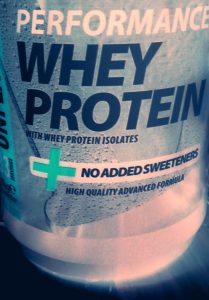 Powdered whey protein is a useful supplement. It provides a simple and cost effective solution to those wishing to increase protein intake. Whey protein holds a number of advantages over other proteins, and in particular, the proteins in whey have been shown to improve a number of biochemical markers relating to immunity. Whey protein in its powdered form is also relatively quick to digest and absorb, and can be consumed in blended fruit drinks and soups. Whey protein is also high in protein, but low in other macronutrients, making the total energy content of the supplement low. As the cost of whey protein has been reduced through increased availability, the supplement has become popular with athletes and non-athletes for its muscle building properties. High protein diets may have weight loss effects and some of this stems from the ability of protein to increase skeletal muscle mass, which in turn may increase metabolic rate. The muscle building effects of whey protein may stem from the leucine content of the protein.
Powdered whey protein is a useful supplement. It provides a simple and cost effective solution to those wishing to increase protein intake. Whey protein holds a number of advantages over other proteins, and in particular, the proteins in whey have been shown to improve a number of biochemical markers relating to immunity. Whey protein in its powdered form is also relatively quick to digest and absorb, and can be consumed in blended fruit drinks and soups. Whey protein is also high in protein, but low in other macronutrients, making the total energy content of the supplement low. As the cost of whey protein has been reduced through increased availability, the supplement has become popular with athletes and non-athletes for its muscle building properties. High protein diets may have weight loss effects and some of this stems from the ability of protein to increase skeletal muscle mass, which in turn may increase metabolic rate. The muscle building effects of whey protein may stem from the leucine content of the protein.

Whey protein powder is a useful supplement for those who want to lose weight. This relates to the fat loss effects of high protein diets. Additional protein may help cause fat loss by increasing skeletal muscle mass, and thereby increase the metabolic rate of the individual. To take advantage of the skeletal muscle enhancing effects of whey protein, the leucine threshold must be reached. This related to the minimum amount of leucine within the protein required to stimulate protein synthesis. Above this threshold, protein synthesis rates will increase and new muscle will be accrued. Below this rate, the additional protein will have no effect. As individuals age, the leucine threshold may increase significantly.
In order to maximise the skeletal muscle building effects of whey protein, the leucine content of the protein needs to be considered. In studies on elderly women who have been assessed to be nitrogen replete, no additional skeletal muscle growth was evident with the addition of 20 grams of whey protein per day. However, this amount of protein may have supplied a level of leucine too low to stimulate protein synthesis. Elderly subjects tend to have attenuated responses to protein synthesis and may require additional leucine compared to younger individuals. In another study, 6.7 grams of essential amino acids with 26 % leucine did not increase protein synthesis in elderly adults, but one with 41 % leucine resulted in a significant increases in protein synthesis. However, in younger adults the lower dose of leucine was enough to stimulate protein synthesis. Therefore in order to stimulate protein synthesis and synthesise new skeletal muscle, a minimum amount of leucine must be supplied, and why protein is an efficient way to provide this leucine.
Eat Well, Stay Healthy, Protect Yourself
RdB
